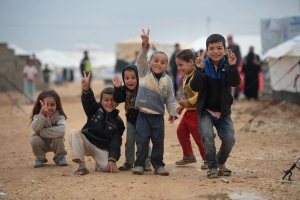Syrian refugees in Sudan say they feel welcomed but life is hard and they may still risk their lives to reach Europe.
Syrians are permitted to enter the country without a visa and, once there, enjoy the same rights and services – such as access to state education and healthcare – as a local. And, unlike the citizens of many other Arab countries, Syrians also get special treatment when it comes to securing residency permits – the result of an agreement between the two countries that dates back to the 1960s.
But Mohammed never imagined that, just a few months later – after revolution and then war came to his country – his family would be forced to follow him and that Syria would, as he says, be “lost”.
‘Guests, not refugees’
“After the revolution in Syria, life became tougher there,” the 26-year-old explains. “My family had to escape, especially after ISIL [the Islamic State of Iraq and the Levant] took over our city.”
Now his family is among the 60,000 Syrian refugees that are, according to Ali al-Sadiq Ghandour, a Sudanese foreign ministry spokesperson, residing in the country.
|
Syrians are guests in my country, not refugees. One day hopefully they will be able to go back. But as long as they stay here they are just like us. |
For them it was an obvious choice: not only because Mohammed was already there, but because they’d heard that Sudan was more welcoming than other countries.
Relatives who’d made their way to Turkey spoke of being given aid but being made to feel unwanted. But in Sudan, Mohammed says, he doesn’t feel like a refugee.
That may, in part, be because the capital, Khartoum, already hosts an established community of Syrian migrants whose presence is perhaps most keenly felt in their popular restaurants, cafes, beauty salons and clothing stores. But it’s also a reflection of the hospitality for which the Sudanese are well-known.
Sudanese shopkeeper Khalid is a typical example of that hospitality. Standing among his shelves stacked with powdered milk, chocolate and biscuits, he explains: “They are welcome here.” The old marble floors are cracked and covered in dust, but the shop was once something to be proud of.
“Syrians are guests in my country, not refugees. One day hopefully they will be able to go back. But as long as they stay here they are just like us,” says Khalid.
According to the UN’s latest estimates, by the end of 2015, there could be a total of 460,000 refugees and asylum seekers from various countries in Sudan.
But for all the generosity of their hosts, life in Sudan is still tough for Mohammed and his family.
Life on hold
“Sudan has its own troubles,” he reflects. “It’s an expensive and tough country to be in if you aren’t economically established.
“The people don’t look down on us and we are allowed to open our own businesses and carry on with life, but for those like us, who don’t have any strong income, life here feels like it’s on hold.”
Still, he says, they are at least “treated like humans here … in comparison [to how Syrian refugees are treated in] other Arab countries”.
Mohammed now lives with his twin brother Ali*, their mother Leyla*, their 17-year-old sister Mariam* and their 10-year-old brother Hassan* in a tiny two-bedroom apartment in the capital.
Their father is still in Raqqa, unable to escape or to settle the debt he accrued in order to pay the smugglers who got Mariam, the last of the family to flee, out of there.
“It wasn’t easy,” Mohammed explains. “We’re in a spiral of debt.”
The constant payments along with the high cost of living in Sudan make life hard. But they are grateful to have their sister with them.
Mariam joined her family at the start of this year. Shy and soft-spoken, she listens as her brother talks, but doesn’t say much herself.
“My daughter has seen a lot,” says her mother, Leyla. “It’s too much for a child her age.”
Mariam doesn’t want to talk about Raqqa or life under ISIL. As her mother speaks, she buries her head in her hands as she remembers things about life back home, and then sneaks away to her bedroom.
The teenager, who wears her hair short and her jeans fashionably tight, now works with her mother in a ladies’ hair salon, where Egyptian music plays loudly and images of fair-skinned, heavily made-up models obscure the view from the street.
Source: aljazeera.net


